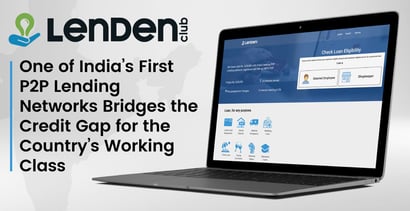

In a Nutshell: India is the second-most populous country in the world, with around 1.4 billion citizens, yet only about 3% of India’s residents have access to credit cards. LenDenClub is leveraging recent developments in P2P technology to facilitate new avenues of funding for individuals and businesses who have historically been unable to receive credit. The transparent P2P platform also generates a revenue stream for middle- and high-income individuals who lend on the network. LenDenClub prioritizes customer satisfaction and makes key company decisions based on feedback from borrowers and lenders. The platform’s latest offering, set for release later this year, is InstaMoney Credit, which will give borrowers access to small loans in minutes.
The Fourth Industrial Revolution is upon us.
Human research and labor is merging with artificial intelligence, blockchain technology is being refined almost daily, and the global economy is more important than ever.
Emerging and fast-growing economies are poised to reap the benefits of these latest developments if they can position themselves strategically in the global market and embrace new ways of production.
 India — with the sixth-largest and one of the fastest-growing economies in the world — is among these countries. But to thrive, India’s consumers and business owners must maintain an active and sustainable commerce model.
India — with the sixth-largest and one of the fastest-growing economies in the world — is among these countries. But to thrive, India’s consumers and business owners must maintain an active and sustainable commerce model.
Out of India’s 1.4 billion people, only about 36 million had credit cards as of 2018. The country’s credit industry was hit hard in 2008’s global financial slump. Only in recent years has the number of credit card holders in the country rebounded to meet and exceed pre-2008 levels.
Still, with such a large population, less than 3% of Indians have access to credit cards, compared with about 70% of Americans who hold credit cards.
Now, thanks to developments in P2P lending models, traditional lines of credit are not as crucial as they once were for facilitating a robust economy.
“Peer-to-peer lending in India is at its nascent stage,” said Bhavin Patel, the CEO and Co-Founder of LenDenClub, one of only a handful of P2P lenders in the country. “The concept is getting wider recognition across Metro, Tier 1 and Tier 2 cities. P2P lending is a new-age investment asset class attracting investors from Generation X to millennials.”
Connecting Lenders to Borrowers Who Historically Did Not Have Avenues to Credit
LenDenClub was created in 2015 to help deliver more economic opportunities to the 20 million to 25 million salaried workers in India who don’t have access to credit through traditional financial institutions, Patel said.
On the lender side, the company also caters to a large pool of middle- and high-income citizens who are interested in structured avenues of investments with fixed timely returns.

Bhavin Patel is the CEO and Co-Founder of LenDenClub, one of India’s first P2P lending platforms.
“LenDenClub is where these two demographics symbiotically meet in a confluence,” according to the company website.
The company offers access to one of the fastest-growing P2P networks in India, Patel said. “It connects individuals or shopkeepers looking for instant loans with lenders who invest in these loans to earn higher returns compared to other investment options.”
LenDenClub was certified as a Non-Banking Financial Company (NBFC) in 2018, following the announcement of new regulations in India.
Since then, the network has grown to accommodate more than 18,000 lenders and 100,000 registered borrowers, Patel said.
Currently, LenDenClub is disbursing more than 2,500 loans per month for up to 5,00,000 or 500K INR with a maximum term of 24 months.
“Imagine getting a loan within hours after applying through a completely online process,” Patel said. “This new concept is gaining popularity among borrowers because of the simple and super-quick process.”
Patel said once borrowers apply for a loan, their profiles go through a personal, professional, and credit history verification — then, LenDenClub generates its own credit score for the potential borrower.
“This score helps lenders in deciding which loan they should invest in depending on their risk-taking capability,” Patel said.
Decisions are Based on Lender and Borrower Feedback
“The P2P concept is still pretty new and it needs to evolve every minute, with every loan application and successful transaction,” Patel said. “We believe in a customer-focused culture.”
He said LenDenClub’s product decisions are driven by constant feedback provided by both borrowers and lenders. “Customer obsession is the keystone value for LDC. We are obsessed with delivering the best to our customers,” according to the company website.
The platform is constantly upgrading its propositions to both lenders and borrowers, with the help of dedicated customer support and product teams, Patel said.

LenDenClub opens up borrowing opportunities for India’s working class while generating returns for lenders.
“Our unique selling proposition is to approve and disburse loans within hours, which makes our clients happy with the LenDenClub platform,” he said.
LenDenClub also strives to make the whole process very transparent for lenders and borrowers.
“Investors/lenders come on the platform and create their lender account,” Patel said. “Once a lender account is generated, he or she gains access to all the borrowers who are looking for a loan. The lender can then transfer the investment amount to the platform’s escrow account and start lending.”
While some tech companies may bristle at new regulations being placed upon them, LenDenClub viewed the Royal Bank of India’s (RBI) introduction of P2P guidelines as a welcome development that will ultimately benefit the industry.
“This RBI notification is a welcome move and will have a positive impact on the entire sector,” Patel said at the time. “In our view, this RBI regulation will bring a much needed legal clarity in the system, and lenders/platform will get legal rights to take adequate steps against defaulters. Also, regulation will mean wide acceptability of this concept among lenders as well as borrowers.”
Forthcoming InstaMoney Credit Feature Will Make Purchasing Even More Convenient
LenDenClub’s core values include providing “an online lending platform to enable borrowers to engage with lenders and for investors to identify and purchase loans that meet their investment criteria by verifying borrower identity, employment, and credit information.”
To that end, Patel said the company seeks to continually refine and improve its offerings to both groups of customers.
“We are soon launching a new product called InstaMoney Credit, which will provide a convenient way for online and offline shoppers,” he said. “Here, the shopper can get an instant credit from 2,000 INR to 5,000 INR on the go, with just a touch.”
This will greatly increase the speed of payments, Patel said, because the borrower isn’t required to input his or her credit card details or wait for two-factor authentication to complete the transaction. He added that access to this service will also lead to more impulse purchases, which will ultimately benefit merchants.
InstaMoney Credit follows on the heels of last year’s launch of InstaMoney, which is a short-term, quick cash loan for salaried individuals in India. InstaMoney loan amounts range from 5,000 INR to 10,000 INR for terms between one to three months.
With LenDenClub’s appeal to tech-forward younger demographics, the company’s P2P services may help India realize its potential in today’s global market.
“With more than 50% of its population under the age of 27, India’s role is also going to be pivotal in shaping the global Fourth Industrial Revolution agenda in a responsible, scalable and inclusive manner,” wrote World Economic Forum President Børge Brende in a 2018 article for Narendra Modi.
Advertiser Disclosure
BadCredit.org is a free online resource that offers valuable content and comparison services to users. To keep this resource 100% free for users, we receive advertising compensation from the financial products listed on this page. Along with key review factors, this compensation may impact how and where products appear on the page (including, for example, the order in which they appear). BadCredit.org does not include listings for all financial products.
Our Editorial Review Policy
Our site is committed to publishing independent, accurate content guided by strict editorial guidelines. Before articles and reviews are published on our site, they undergo a thorough review process performed by a team of independent editors and subject-matter experts to ensure the content’s accuracy, timeliness, and impartiality. Our editorial team is separate and independent of our site’s advertisers, and the opinions they express on our site are their own. To read more about our team members and their editorial backgrounds, please visit our site’s About page.




